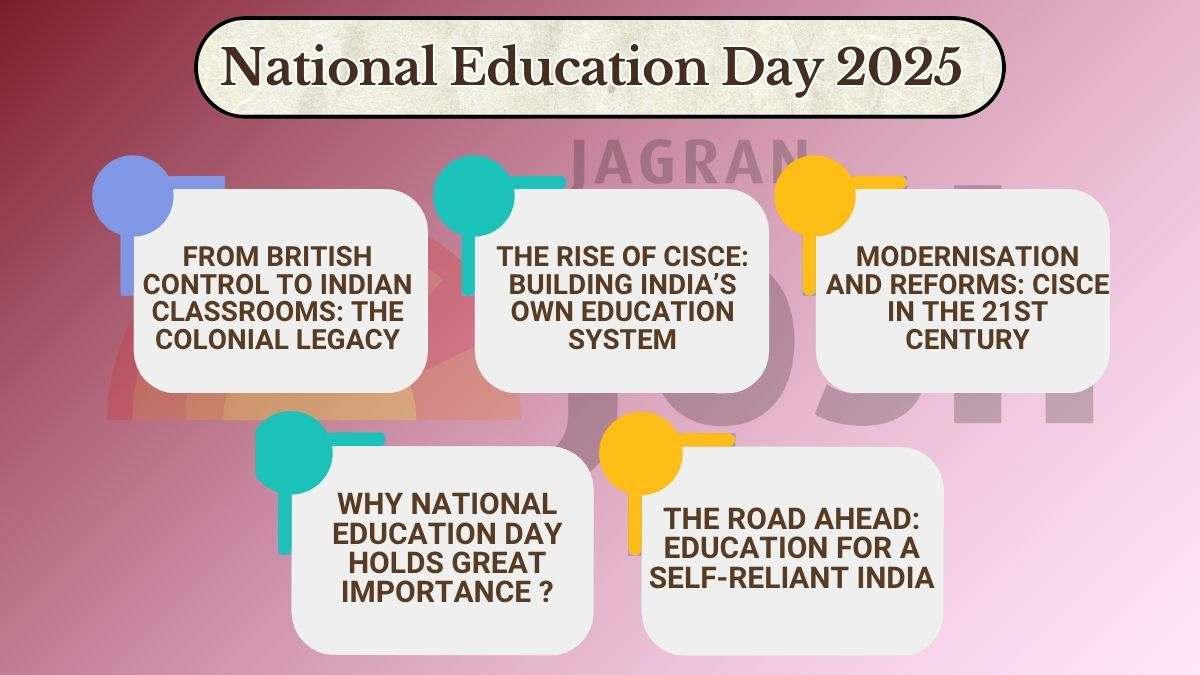National Education Policy 2025: Every year on November 11, India celebrates National Education Day to honour Maulana Abul Kalam Azad, the country’s first Education Minister and a key architect of independent India’s learning framework. The day is a reminder of how education shapes a nation’s identity and future. As we celebrate this occasion in 2025, it’s important to look back at one of the most defining chapters in Indian education: how India’s schools broke away from colonial systems to establish their own national identity in learning and evaluation.

1. From British Control to Indian Classrooms: The Colonial Legacy
Before independence and even in the early years after 1947, India’s education system continued to be heavily influenced by British frameworks. The Cambridge University Local Examinations Syndicate (UCLES) in England once conducted exams for Indian students under the Indian Certificate of Secondary Education (ICSE) and Indian School Certificate (ISC).
The exam papers were set, marked, and evaluated in the UK, and results were then sent back to India. This process reflected the lingering colonial control over Indian education, even after the country had gained political freedom.
2. The Rise of CISCE: Building India’s Own Education System
To establish autonomy in education, the Council for the Indian School Certificate Examinations (CISCE) was formed in 1958 in New Delhi. Guided by the vision of Maulana Abul Kalam Azad, India’s Education Ministry aimed to create an education board that represented the values, culture, and needs of a free India.
By the early 1970s, Indian examiners began setting and marking examination papers locally. Finally, in 1975, the CISCE conducted its first fully Indian-administered ICSE and ISC examinations, marking the end of British involvement in Indian secondary education. This was a proud moment, a symbol of India’s educational self-reliance and confidence.
3. Modernisation and Reforms: CISCE in the 21st Century
Today, the CISCE is known for its comprehensive, flexible, and globally recognised curriculum. It aligns with the National Education Policy (NEP) 2020, focusing on competency-based learning, multilingual education, technology integration, and inclusion of Indian knowledge systems.
The board’s approach balances academic excellence with holistic development, preparing students not only for higher studies but also for life skills, innovation, and critical thinking. The CISCE’s journey from colonial oversight to full autonomy represents India’s broader transformation in education, one rooted in independence, adaptability, and national pride.
4. Why National Education Day Holds Great Importance ?
National Education Day celebrates more than just the birth anniversary of Maulana Azad; it symbolises the evolution of India’s educational spirit. The transition from foreign-controlled examinations to an Indian framework highlighted the country’s determination to shape its own destiny in learning.
It’s also a day to reflect on how far India has come and how much more can be achieved by bridging learning gaps, improving digital access, and promoting equality in education. The principles championed by Maulana Azad continue to inspire policies that encourage inclusivity, innovation, and lifelong learning.
5. The Road Ahead: Education for a Self-Reliant India
As India moves toward a future powered by youth and knowledge, several priorities define its educational goals:
-
Equal Access: Ensuring every child in India, regardless of background, has access to quality education.
-
Skill-Based Learning: Moving beyond rote learning to creativity, problem-solving, and digital literacy.
-
Cultural Integration: Strengthening Indian languages, art, and values in the modern curriculum.
-
Continuous Innovation: Encouraging reforms in assessment, teaching methods, and technology adoption.
These changes are a continuation of the same vision that started with Azad to make education not just a privilege, but a tool for national progress.
On National Education Day 2025, the story of CISCE’s independence from British control reminds us that true freedom lies in shaping our own systems of learning. What began as a small step in 1958 evolved into a nationwide movement towards educational empowerment. Maulana Abul Kalam Azad’s dream of an educated, self-reliant India continues to inspire teachers, students, and policymakers even today. As India advances toward becoming a global education hub, it carries forward his message that education is the foundation of freedom, progress, and unity.
Also Check:
Comments
All Comments (0)
Join the conversation